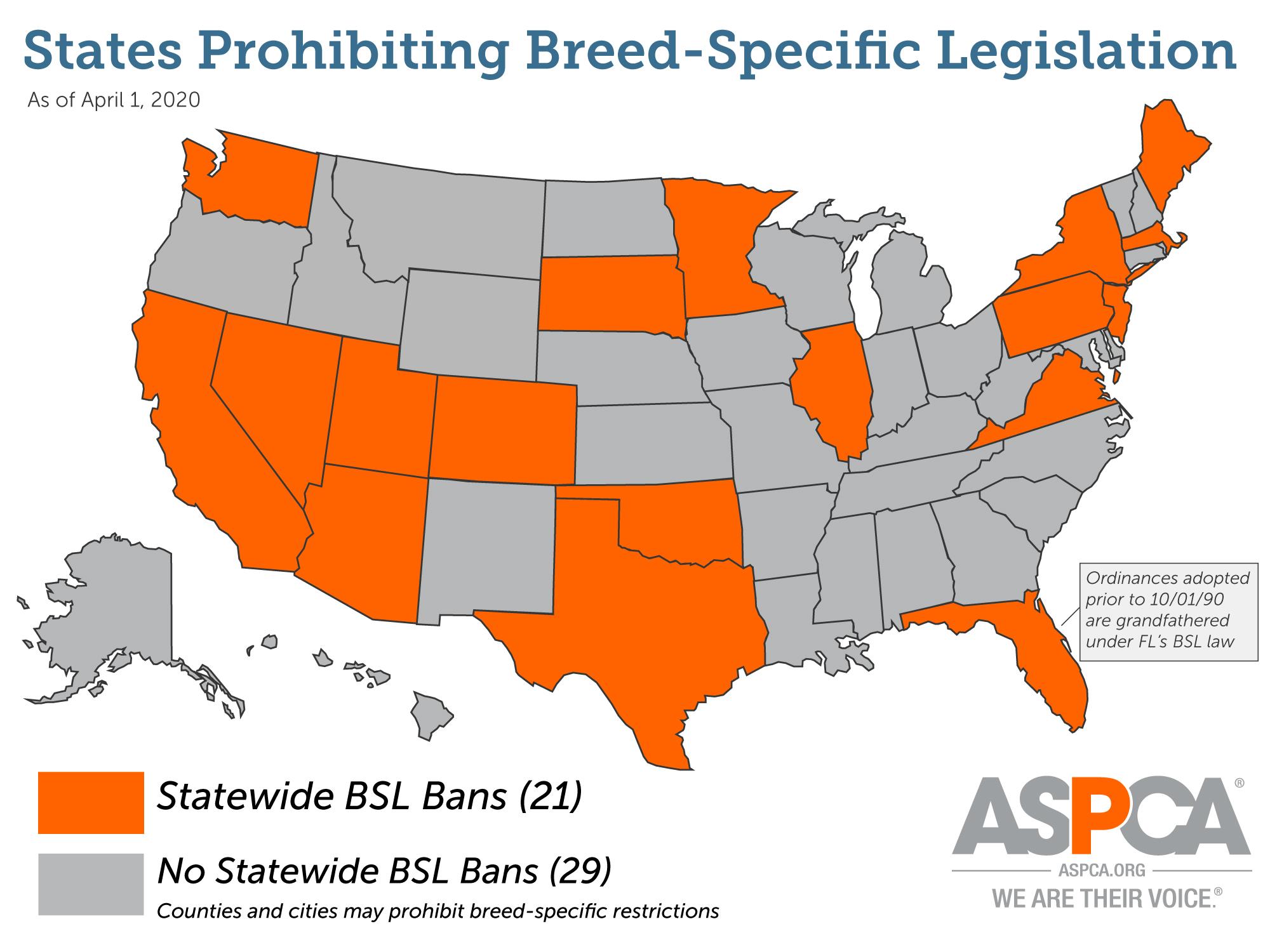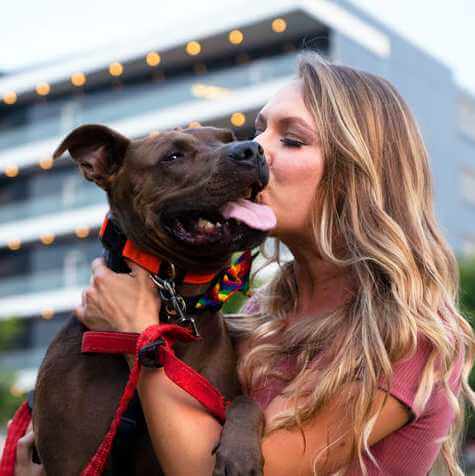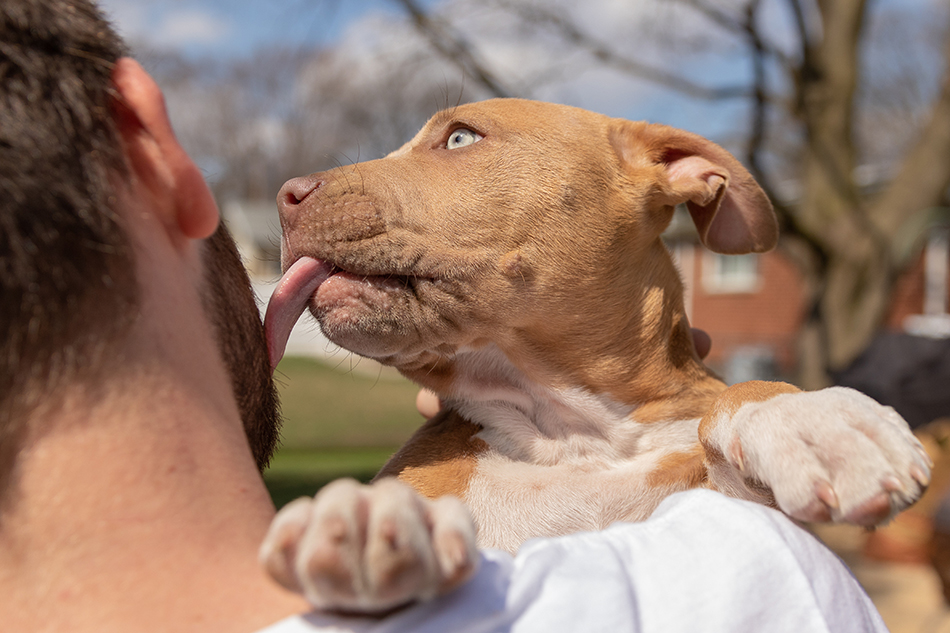In this post:
- What is Breed Specific Legislature (BSL)?
- How does BSL affect dog owners?
- How is BSL passed?
- Does BSL keep communities safe?
Over the years, the media has reported thousands of stories about injuries inflicted by dogs on humans or other animals. While these attacks come from a variety of situations (organized dogfighting, dogs acting as an attack or guard animals, random neighborhood altercations) the United States government has adopted a variety of blanket laws and legislations in an attempt to address the issue. One of the most problematic regulations is Breed Specific Legislation or BSL.
What is Breed Specific Legislature (BSL)?
BSL was first enacted in the United States in 1987 in Yakima, Washington, and was sold as an attempt to keep communities safe from dog breeds that have been labeled “dangerous”.
The law stated, “It is unlawful to keep, or harbor, own or in any way possess a pit bull dog within the city of Yakima. Violation of this section is a gross misdemeanor. The minimum fine for a violation of this section shall be two hundred fifty dollars for the first offense and five hundred dollars for a second or subsequent offense, which fine shall not be suspended or deferred. For purposes of this section, proof of a prior violation shall not require proof that the same pit bulldog is involved. Each day of violation shall be a separate offense.”
By 2008, the ban had spread to 22 other municipalities. While the intentions may sound good, BSL is based on fear-mongering and the belief that a particular type of breed is causing issues in a town or a city and therefore should be muzzled or eradicated.
The breeds that almost always fall under these harmful regulations are breeds that are classified as “pit bulls”. This includes American Pit Bull Terriers, American Staffordshire Terriers, Staffordshire Bull Terriers, and English Bull Terriers. In some areas, regulation expands to include an even wider variety of dogs, such as American Bulldogs, Rottweilers, Mastiffs, Dalmatians, Chow Chows, German Shepherds, Doberman Pinschers or any mix of these breeds—sometimes even dogs who simply resemble these breeds.

How does BSL affect dog owners?
When a full breed ban is enacted in a community, it requires dogs of a particular appearance and/or breed to be removed from the municipality where the ban has been implemented. In some cases, these dogs are subject to being killed by animal control, though sometimes such dogs may be saved if relocation is an option.
Breed-specific restrictions may require an owner of a targeted breed do any of the following or more, depending on how the law is written:
- Muzzle the dog in public
- Spay or neuter the dog
- Contain the dog in a kennel with specific requirements (6′ chain-link walls, lid, concrete floors, etc.)
- Keep the dog on a leash of particular length or material
- Purchase liability insurance of a certain amount
- Place “vicious dog” signs on the outside of the residence where the dog lives
- Make the dog wear a “vicious dog” tag or other identifying markers
This essentially criminalizes people just because they have a particular breed of dog, or their dog looks a certain way, which is incredibly unfair. And in reality, the people who completely disregard the law are the people they are really trying to target. Irresponsible dog owners who purchased these breeds with the intention of training them poorly and teaching them aggressive behaviors. Because they had no intention to do the right thing in the first place, it is a waste of time and resources to expecting them to register their dogs for $150 and keep them on a muzzle. In actuality, it’s affecting responsible people like you and me, who care about our dogs and our community.
For another example of how ineffective this type of legislation is, just look at cigarettes. We all know that smoking leads to a terrifying variety of health issues that include lung cancer and emphysema.
There is even a prominent warning on the label about the dangers of smoking on every package of cigarettes.


However, this has done next to nothing to stop people from consuming tobacco products. There is a law against dogfighting, yet practically every month we find out about yet another underground dogfighting ring. So, the chances of an irresponsible dog owner to suddenly decide to follow the rules legislated by their local government are slim to none.
Instead what will happen is the responsible owners of these amazing dogs will be punished. People who have already done everything in their power to have a healthy and safe dog. They have spayed and neutered their dog, spent money and time on training, made provisions to monitor and keep their dog safe in their yards.
However, with BSL they are now treated like criminals and forced to purchase expensive insurance, muzzle their dog, or, in the case of a ban, get rid of their companion altogether.
How is BSL passed?
When BSL is passed in a state, most of the time it is there was some kind of isolated incident; a bite or a fatality that took place and quickly garnered media attention. While these stories excite people, what they don’t do is consider what happened, and why? Instead, they only focus on one thing; What kind of dog was that and how can we get rid of that breed.
This is neither an intellectual nor a scientific approach to the issue and does absolutely nothing to keep that community safe from future incidents. The goal should be to make sure we are keeping our dogs safe so that we can continue to keep our community safe. And that is not a breed-specific issue, that is a human being issue.
Does BSL keep communities safe?

There is no evidence that BSL makes a community safer for people or for pets. The Center for Disease Control and Prevention (CDC) conducted a thorough study of dog-bite related fatalities and could find no natural correlation between dog breeds and aggression. As a result, they decided to strongly oppose BSL citing, among other problems, the inaccuracy of dog bite data and the difficulty in identifying dog breeds (especially true of mixed-breed dogs).
This study was also referenced in 2013 when the White House released a statement announcing that their administration does not support BSL. Quote, “…research shows that bans on certain types of dogs are largely ineffective and often a waste of public resources.”
Fortunately, the majority of the states have now banned or do not have any Breeds Specific Legislation:
Final thoughts:
Special thanks to:

Deirdre ‘Little Darling’ Franklin, MSPP
Deirdre “Little Darling” Franklin is the founder, president, and soul behind Pinups for Pitbulls. She holds a master’s degree in public policy from Drexel University, where she specialized in breed-specific legislation. She is also the Volunteer & Foster Manager for the ASPCA Behavioral Rehabilitation Center in Weaverville, NC.





